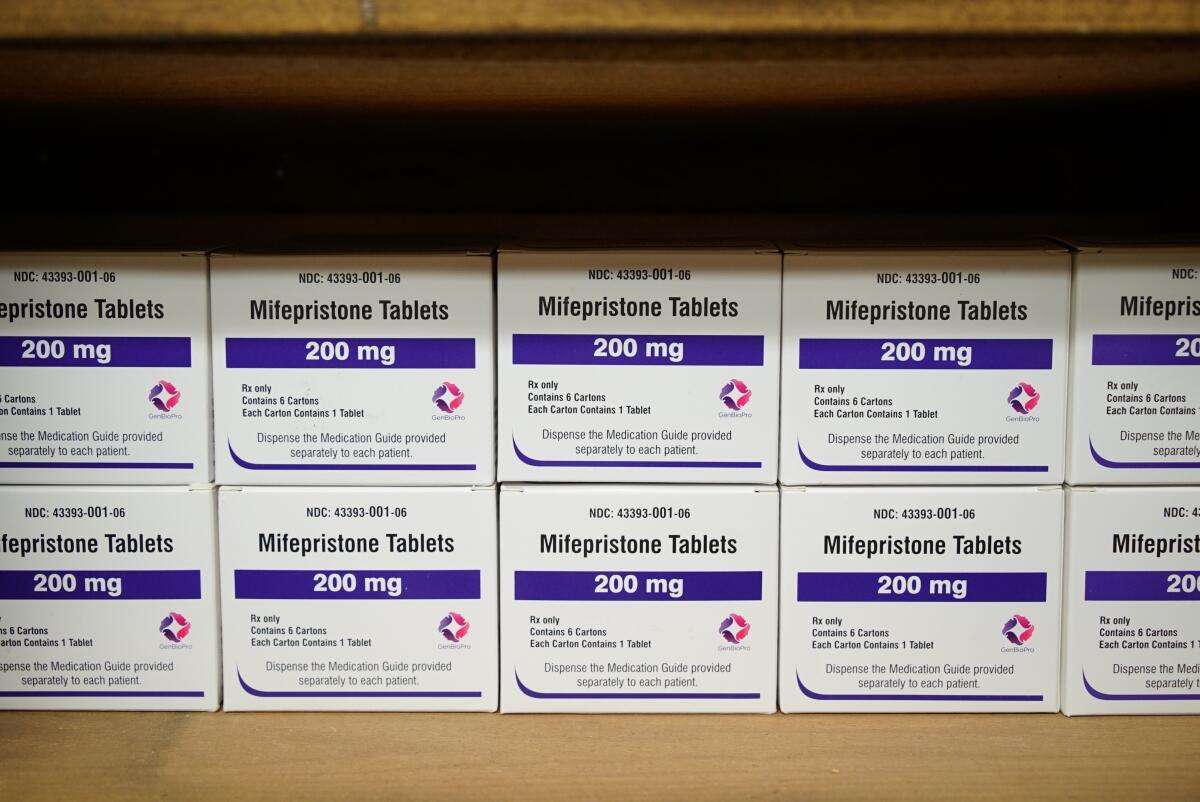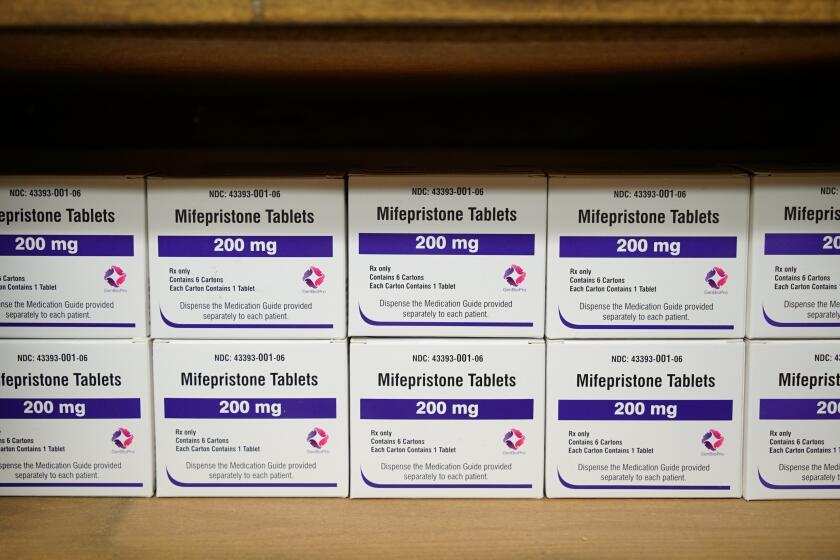News Analysis: FDA case may reveal if Supreme Court conservative justices are abortion foes above all else

- Share via
WASHINGTON — The Supreme Court’s fast-track encounter with abortion pills this week may reveal much about the three justices who were crucial to overturning Roe vs. Wade and the constitutional right to abortion.
Are they traditional conservatives who are skeptical of politically driven lawsuits that seek to change the law and public policy?
Or are they so deeply opposed to abortion that they will look favorably on a lawsuit that would overturn regulations set by the Food and Drug Administration and sharply limit access to a medication that has been used by more than 5 million American women over two decades?
A partial answer may come soon. Justice Samuel A. Alito Jr., who oversees appeals from Texas and Louisiana, issued an administrative stay to put the matter on hold until Wednesday.
The nine justices must decide whether to block a lower court decision to revoke the FDA’s approval of the drug, mifepristone, entirely or impose new restrictions on its use, such as forbidding sending the drug through the mail or limiting its use to end pregnancies to seven weeks instead of the FDA’s current 10-week limit.
Atty. Gen. Merrick Garland says the justices will be asked to preserve full and easy access to mifepristone, now the most-used method of ending early pregnancies.
It takes a five-vote majority to issue such an order. Assuming the three liberal justices vote to block the lower court’s ruling, that means the Biden administration needs the support of at least two conservative justices.
Chief Justice John G. Roberts Jr. is a strong possibility since he parted with his conservative colleagues last year and voted against overturning Roe, though he supported upholding Mississippi’s 15-week limit on abortion.
Alito, who wrote the 5-4 opinion in the Dobbs case overturning Roe, has a long track record of opposing abortion rights, as does Justice Clarence Thomas.
Justices Amy Coney Barrett, Neil M. Gorsuch and Brett M. Kavanaugh are harder to predict.
All three voted to overturn Roe, a landmark ruling that many conservatives never accepted, in part because it began with a 1970 liberal, public-interest lawsuit that eventually struck down abortion restrictions in 46 states.
Barrett, a former Notre Dame law professor, made clear she was morally opposed to abortion, but told senators during her Senate confirmation that her personal views would not determine her decisions in court.
In past writings before he was a judge, Gorsuch pondered whether a fetus could be considered a person protected by the Constitution. He, too, insisted during his confirmation he would decide legal questions based on the law, not his personal beliefs.
Kavanaugh joined them to overturn Roe and wrote in his concurring opinion that because the Constitution said nothing about abortion, decisions about it should not rest with judges.
“The nine members of this court will no longer decide the basic legality of pre-viability abortion for all 330 million Americans,” he wrote. “That issue will be resolved by the people and their representatives in the democratic process in the states or Congress.”
That pledge is now being put to the test.
Gov. Gavin Newsom announced a stockpile of 2 million abortion pills known as misoprostol after a Texas judge ruled against using a mifepristone, another medication to terminate pregnancies.
Not long after the justices struck down the nationwide right to abortion, a group of antiabortion advocates that included doctors set up an office in Amarillo, Texas. They filed a lawsuit to challenge the legality of mifepristone, knowing it would come before U.S. District Judge Matthew Kacsmaryk, a Trump appointee with strong antiabortion views.
As widely predicted, Kacsmaryk revoked the FDA’s 2000 approval of mifepristone and said his nationwide order would take effect a week later.
That sent Justice Department lawyers to the 5th Circuit Court of Appeals in New Orleans seeking to block Kacsmaryk’s decision.
A 2-1 majority agreed it may be too late to challenge the safety of a drug used since 2000, but not too late to strike down the FDA’s decisions from 2016 to extend use of the pill to end pregnancies up to 10 weeks and permit sending it by mail.
Appealing to the Supreme Court, Solicitor Gen. Elizabeth Prelogar argued the decisions from Texas broke with decades of settled law and practice. The abortion pills had remained legal under five presidents — Republicans and Democrats — and no judge had invalidated the FDA’s approval of a drug, she said.
She stressed how the decisions conflict with the legal principles espoused by conservatives.
Usually, they are wary of according standing to litigants who simply disagree with a law or government policy and cannot show how they are or will be personally harmed as a result.
The antiabortion doctors, of course, do not perform abortions or prescribe abortion pills. So how could they be injured?
Kacsmaryk theorized that “adverse events from chemical abortion drugs can overwhelm the medical system,” and as a result, an antiabortion doctor who works in an emergency room may be forced to treat a patient in distress after taking the pills.
Justice Department lawyers called that far-fetched, considering that mifepristone has been on the market for decades and has proved to be safe when used in combination with a second drug, misoprostol.
Conservative justices have also consistently deferred to the FDA on matters of drug safety.
Just two years ago, the court’s conservatives set aside an order from a judge in Maryland who had temporarily lifted the FDA’s requirement that women seeking the abortion pill must first go in person to a hospital or medical clinic.
Because of the COVID-19 pandemic, the Maryland judge said such visits posed a danger to the health of these patients, and he issued a nationwide order to block the rule.
When the outgoing Trump administration appealed on behalf of the FDA, the Supreme Court issued a brief order overturning the district judge.
“My view is that courts owe significant deference to the politically accountable entities with the background, competence, and expertise to assess public health,” Roberts wrote in FDA vs. American College of Obstetricians and Gynecologists.
Writing separately, Alito and Thomas criticized the judge for taking it “upon himself to overrule the FDA on a question of drug safety,” and for ignoring the court’s past warnings “against judicial second guessing of officials with public health responsibilities.”
While the three liberal justices dissented, the order spoke for the rest of the court.
In decades past, the late Justice Antonin Scalia often railed that his liberal colleagues would distort the law whenever an abortion case came before them.
“Does the deck seem stacked? You bet,” he wrote in dissent in 2000 when the court upheld an 8-foot buffer zone around people entering or leaving a medical clinic. He thought it clearly violated the free-speech rights of sidewalk protesters.
“Today’s decision is not an isolated distortion ... but one of many aggressively pro-abortion novelties announced by the court in recent years.”
Now that the court has a solidly conservative majority, liberals worry about what might be called aggressively antiabortion novelties.
More to Read
Get the L.A. Times Politics newsletter
Deeply reported insights into legislation, politics and policy from Sacramento, Washington and beyond. In your inbox twice per week.
You may occasionally receive promotional content from the Los Angeles Times.












